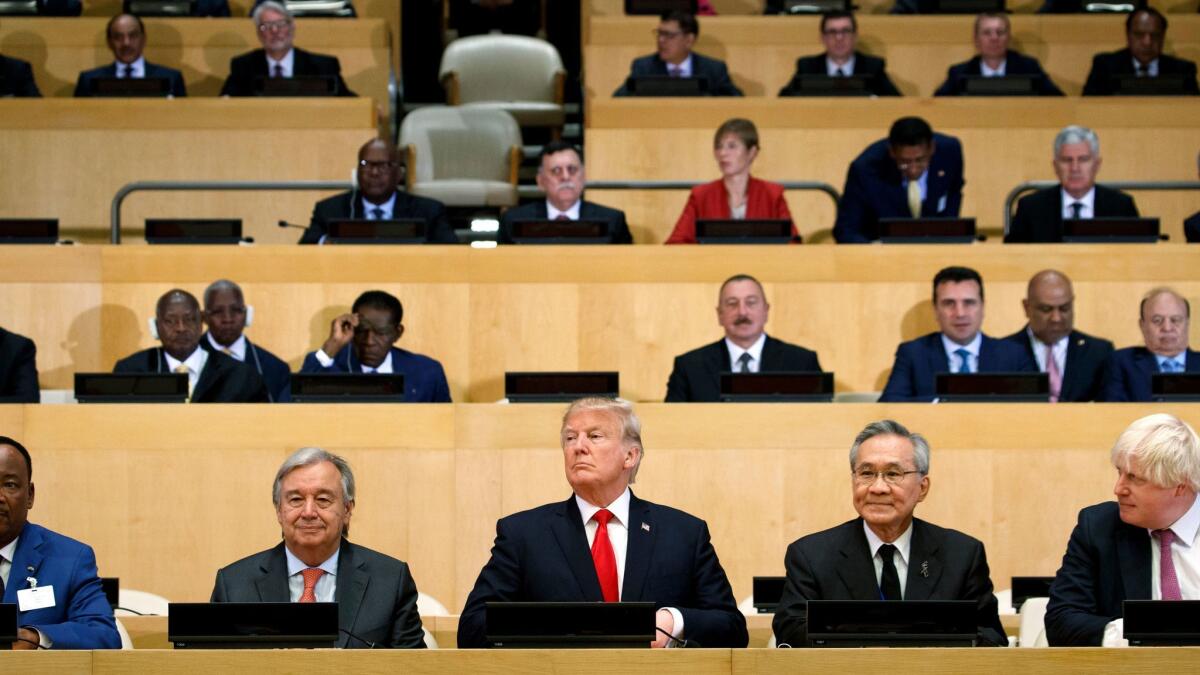Trump condemns ābureaucracy and mismanagementā at the U.N.

Reporting from United Nations ā Acting more the statesman than the flamethrower, President Trump made a smooth debut at the United Nations on Monday, chairing a meeting on reforming U.N. operations and agencies, and urging the global body to āfocus more on people and less on bureaucracy.ā
He called for the 193 member nations to contribute more to the U.N. budget and decried what his administration sees as an anti-Israel bias.
āIn recent years,ā Trump said, āthe United Nations has not reached its full potential due to bureaucracy and mismanagement.ā
Accompanied by Secretary of State Rex Tillerson and other senior aides, Trump will spend four days in New York for bilateral meetings with allies, working lunches, ceremonial dinners and other events.
He will take center stage Tuesday morning in his first speech to the General Assembly, an address that the White House says will explain how Trumpās āAmerica firstā doctrine and agenda fit in with the role of international institutions.
As a candidate, Trump was openly dismissive of the U.N., saying it did not defend democracy and was a wasteful gabfest for āpeople to have a good time.ā
But in his brief public remarks Monday, he said the body āwas founded on truly noble goals.ā He praised reform efforts led by Secretary-General Antonio Guterres to āhold every level of management accountable, protect whistle-blowers and focus on results rather than on process.ā
Trump called on member states to reject ābusiness as usualā and not be ābeholden to ways of the past which were not working.ā
Noting that the U.N. budget has grown 140% and its staff has doubled since 2000, he added, āWe are not seeing the results in line with this investment.ā
He raised eyebrows only when he began his remarks by noting that he foresaw āgreat potentialā in real estate near the U.N., and that the Trump World Tower across the street āturned out to be such a successful project.ā
Later he met separately with Israeli Prime Minister Benjamin Netanyahu and French President Emmanuel Macron at a nearby hotel. Trump told reporters that he had enjoyed the two-hour Bastille Day military parade in Paris so much that he hoped to stage a similar military extravaganza next July 4 in front of the White House.
āSo weāre actually thinking about Fourth of July, Pennsylvania Avenue, having a really great parade to show our military strength,ā he said.
The Pentagon later said it had no such plans underway.
A senior White House official separately offered perspective for Trumpās address to the General Assembly, saying it ārepresents the presidentās vision and declaration to the rest of the world about how America fits into the world.ā
The official, who briefed reporters on condition he not be identified, called Trumpās doctrine one of āprincipled realism,ā which he defined as a clear-eyed look at the world, ādriven by outcomes, not by ideology.ā
Within that vision, the United States will no longer focus on nation-building and imposing democracy abroad, as conducted by previous Republican and Democratic administrations, the official said.
Nor will America dictate how other nations should live or the type of government they have ā unless they threaten U.S. security.
Instead, U.S. behavior is aimed at seeking stability, mutual prosperity among nations and the security that results from that, the official said.
The official pointed to two of Trumpās prior speeches as laying the groundwork for the U.N. address.
The first, in May at the Arab Islamic American Summit in Saudi Arabia, called on nations to share the burden in the fight against terrorism. But critics said Trump also used the speech to back away from U.S. concerns about human rights abuses overseas.
āWe are not here to lecture ā we are not here to tell other people how to live, what to do, who to be, or how to worship. Instead, we are here to offer partnership ā based on shared interests and values ā to pursue a better future for us all,ā Trump said at the time.
The second speech, in Poland in July, focused on ācivilizational values and what makes us special,ā the official said.
The official said Trump sees the original charter for the U.N. as a vehicle for sovereign nations to cooperate rather than a bureaucracy in and of itself.
Trump is expected to call out North Korea and Iran ā and to a lesser extent Venezuela ā as a āshared menaceā in his speech Tuesday.
To meet that threat, Trump will argue that ānations cannot be bystanders to history,ā the official added.
Wilkinson reported from the United Nations and Bierman from Washington.
For more on international affairs, follow @TracyKWilkinson on Twitter
More to Read
Sign up for Essential California
The most important California stories and recommendations in your inbox every morning.
You may occasionally receive promotional content from the Los Angeles Times.












